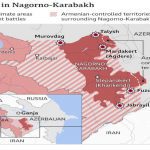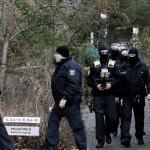Syrian rebels have taken control of Damascus and announced this morning that they’ve toppled the government of Bashar al-Assad, who ruled Syria for nearly 25 years.
However, it’s currently unclear where Assad is.
There are reports that the deposed leader boarded a plane out of Damascus. Reuters news agency says two senior army officials claim Assad flew from the city to an unknown location early on Sunday.
Turkey’s foreign minister suggests Assad is likely out of the country now but hasn’t revealed where he might be. Similarly, a top diplomat from the UAE has neither confirmed nor denied if Assad has sought refuge in Abu Dhabi.
Damascus is relatively quiet, but there is a lot of gunfire and the occasional sound of an explosion—it seems to be celebratory.
There are cars on the streets, but the shops are closed.
It looks like most people are keeping a low profile, or at least not coming to the centre of town.
At one location where armed men had gathered, we were told they were protecting their building from possible looters.
This surprising rebel victory in Syria is being led by the most powerful Islamist group, Hayat Tahrir al-Sham, a political and paramilitary force.
It emerged from the Syrian uprising of 2011 as an affiliate of Al-Qaeda but formally broke ties with it in 2016.
For years, its leader Abu Mohammed al-Jawlani has been trying to change his group’s image abroad while enforcing strict Islamist rule in the northwest corner of Syria under his control.
Recently, he assured Syria’s many minority communities they had no reason to worry.
However, HTS is still classified by Western governments as a terrorist organisation, and its sudden rise is raising questions and concerns not just in Syria but in neighbouring countries.
There’s also concern about how it will cooperate with other rebels, including a group of Turkish-backed militias known as the Syrian National Army, Kurdish fighters in the northwest, and a newly formed faction, the Southern Operations Room, which includes fighters who worked closely with the West in the early years of the Syrian uprising.
Syrian rebels have taken control of Damascus and announced this morning that they’ve toppled the government of Bashar al-Assad, who ruled Syria for nearly 25 years.
However, it’s currently unclear where Assad is.
There are reports that the deposed leader boarded a plane out of Damascus. Reuters news agency says two senior army officials claim Assad flew from the city to an unknown location early on Sunday.
Turkey’s foreign minister suggests Assad is likely out of the country now but hasn’t revealed where he might be. Similarly, a top diplomat from the UAE has neither confirmed nor denied if Assad has sought refuge in Abu Dhabi.
Damascus is relatively quiet, but there is a lot of gunfire and the occasional sound of an explosion—it seems to be celebratory.
There are cars on the streets, but the shops are closed.
It looks like most people are keeping a low profile, or at least not coming to the centre of town.
At one location where armed men had gathered, we were told they were protecting their building from possible looters.
This surprising rebel victory in Syria is being led by the most powerful Islamist group, Hayat Tahrir al-Sham, a political and paramilitary force.
It emerged from the Syrian uprising of 2011 as an affiliate of Al-Qaeda but formally broke ties with it in 2016.
For years, its leader Abu Mohammed al-Jawlani has been trying to change his group’s image abroad while enforcing strict Islamist rule in the northwest corner of Syria under his control.
Recently, he assured Syria’s many minority communities they had no reason to worry.
However, HTS is still classified by Western governments as a terrorist organisation, and its sudden rise is raising questions and concerns not just in Syria but in neighbouring countries.
There’s also concern about how it will cooperate with other rebels, including a group of Turkish-backed militias known as the Syrian National Army, Kurdish fighters in the northwest, and a newly formed faction, the Southern Operations Room, which includes fighters who worked closely with the West in the early years of the Syrian uprising.
Syrian rebels have taken control of Damascus and announced this morning that they’ve toppled the government of Bashar al-Assad, who ruled Syria for nearly 25 years.
However, it’s currently unclear where Assad is.
There are reports that the deposed leader boarded a plane out of Damascus. Reuters news agency says two senior army officials claim Assad flew from the city to an unknown location early on Sunday.
Turkey’s foreign minister suggests Assad is likely out of the country now but hasn’t revealed where he might be. Similarly, a top diplomat from the UAE has neither confirmed nor denied if Assad has sought refuge in Abu Dhabi.
Damascus is relatively quiet, but there is a lot of gunfire and the occasional sound of an explosion—it seems to be celebratory.
There are cars on the streets, but the shops are closed.
It looks like most people are keeping a low profile, or at least not coming to the centre of town.
At one location where armed men had gathered, we were told they were protecting their building from possible looters.
This surprising rebel victory in Syria is being led by the most powerful Islamist group, Hayat Tahrir al-Sham, a political and paramilitary force.
It emerged from the Syrian uprising of 2011 as an affiliate of Al-Qaeda but formally broke ties with it in 2016.
For years, its leader Abu Mohammed al-Jawlani has been trying to change his group’s image abroad while enforcing strict Islamist rule in the northwest corner of Syria under his control.
Recently, he assured Syria’s many minority communities they had no reason to worry.
However, HTS is still classified by Western governments as a terrorist organisation, and its sudden rise is raising questions and concerns not just in Syria but in neighbouring countries.
There’s also concern about how it will cooperate with other rebels, including a group of Turkish-backed militias known as the Syrian National Army, Kurdish fighters in the northwest, and a newly formed faction, the Southern Operations Room, which includes fighters who worked closely with the West in the early years of the Syrian uprising.
Syrian rebels have taken control of Damascus and announced this morning that they’ve toppled the government of Bashar al-Assad, who ruled Syria for nearly 25 years.
However, it’s currently unclear where Assad is.
There are reports that the deposed leader boarded a plane out of Damascus. Reuters news agency says two senior army officials claim Assad flew from the city to an unknown location early on Sunday.
Turkey’s foreign minister suggests Assad is likely out of the country now but hasn’t revealed where he might be. Similarly, a top diplomat from the UAE has neither confirmed nor denied if Assad has sought refuge in Abu Dhabi.
Damascus is relatively quiet, but there is a lot of gunfire and the occasional sound of an explosion—it seems to be celebratory.
There are cars on the streets, but the shops are closed.
It looks like most people are keeping a low profile, or at least not coming to the centre of town.
At one location where armed men had gathered, we were told they were protecting their building from possible looters.
This surprising rebel victory in Syria is being led by the most powerful Islamist group, Hayat Tahrir al-Sham, a political and paramilitary force.
It emerged from the Syrian uprising of 2011 as an affiliate of Al-Qaeda but formally broke ties with it in 2016.
For years, its leader Abu Mohammed al-Jawlani has been trying to change his group’s image abroad while enforcing strict Islamist rule in the northwest corner of Syria under his control.
Recently, he assured Syria’s many minority communities they had no reason to worry.
However, HTS is still classified by Western governments as a terrorist organisation, and its sudden rise is raising questions and concerns not just in Syria but in neighbouring countries.
There’s also concern about how it will cooperate with other rebels, including a group of Turkish-backed militias known as the Syrian National Army, Kurdish fighters in the northwest, and a newly formed faction, the Southern Operations Room, which includes fighters who worked closely with the West in the early years of the Syrian uprising.
Syrian rebels have taken control of Damascus and announced this morning that they’ve toppled the government of Bashar al-Assad, who ruled Syria for nearly 25 years.
However, it’s currently unclear where Assad is.
There are reports that the deposed leader boarded a plane out of Damascus. Reuters news agency says two senior army officials claim Assad flew from the city to an unknown location early on Sunday.
Turkey’s foreign minister suggests Assad is likely out of the country now but hasn’t revealed where he might be. Similarly, a top diplomat from the UAE has neither confirmed nor denied if Assad has sought refuge in Abu Dhabi.
Damascus is relatively quiet, but there is a lot of gunfire and the occasional sound of an explosion—it seems to be celebratory.
There are cars on the streets, but the shops are closed.
It looks like most people are keeping a low profile, or at least not coming to the centre of town.
At one location where armed men had gathered, we were told they were protecting their building from possible looters.
This surprising rebel victory in Syria is being led by the most powerful Islamist group, Hayat Tahrir al-Sham, a political and paramilitary force.
It emerged from the Syrian uprising of 2011 as an affiliate of Al-Qaeda but formally broke ties with it in 2016.
For years, its leader Abu Mohammed al-Jawlani has been trying to change his group’s image abroad while enforcing strict Islamist rule in the northwest corner of Syria under his control.
Recently, he assured Syria’s many minority communities they had no reason to worry.
However, HTS is still classified by Western governments as a terrorist organisation, and its sudden rise is raising questions and concerns not just in Syria but in neighbouring countries.
There’s also concern about how it will cooperate with other rebels, including a group of Turkish-backed militias known as the Syrian National Army, Kurdish fighters in the northwest, and a newly formed faction, the Southern Operations Room, which includes fighters who worked closely with the West in the early years of the Syrian uprising.
Syrian rebels have taken control of Damascus and announced this morning that they’ve toppled the government of Bashar al-Assad, who ruled Syria for nearly 25 years.
However, it’s currently unclear where Assad is.
There are reports that the deposed leader boarded a plane out of Damascus. Reuters news agency says two senior army officials claim Assad flew from the city to an unknown location early on Sunday.
Turkey’s foreign minister suggests Assad is likely out of the country now but hasn’t revealed where he might be. Similarly, a top diplomat from the UAE has neither confirmed nor denied if Assad has sought refuge in Abu Dhabi.
Damascus is relatively quiet, but there is a lot of gunfire and the occasional sound of an explosion—it seems to be celebratory.
There are cars on the streets, but the shops are closed.
It looks like most people are keeping a low profile, or at least not coming to the centre of town.
At one location where armed men had gathered, we were told they were protecting their building from possible looters.
This surprising rebel victory in Syria is being led by the most powerful Islamist group, Hayat Tahrir al-Sham, a political and paramilitary force.
It emerged from the Syrian uprising of 2011 as an affiliate of Al-Qaeda but formally broke ties with it in 2016.
For years, its leader Abu Mohammed al-Jawlani has been trying to change his group’s image abroad while enforcing strict Islamist rule in the northwest corner of Syria under his control.
Recently, he assured Syria’s many minority communities they had no reason to worry.
However, HTS is still classified by Western governments as a terrorist organisation, and its sudden rise is raising questions and concerns not just in Syria but in neighbouring countries.
There’s also concern about how it will cooperate with other rebels, including a group of Turkish-backed militias known as the Syrian National Army, Kurdish fighters in the northwest, and a newly formed faction, the Southern Operations Room, which includes fighters who worked closely with the West in the early years of the Syrian uprising.
Syrian rebels have taken control of Damascus and announced this morning that they’ve toppled the government of Bashar al-Assad, who ruled Syria for nearly 25 years.
However, it’s currently unclear where Assad is.
There are reports that the deposed leader boarded a plane out of Damascus. Reuters news agency says two senior army officials claim Assad flew from the city to an unknown location early on Sunday.
Turkey’s foreign minister suggests Assad is likely out of the country now but hasn’t revealed where he might be. Similarly, a top diplomat from the UAE has neither confirmed nor denied if Assad has sought refuge in Abu Dhabi.
Damascus is relatively quiet, but there is a lot of gunfire and the occasional sound of an explosion—it seems to be celebratory.
There are cars on the streets, but the shops are closed.
It looks like most people are keeping a low profile, or at least not coming to the centre of town.
At one location where armed men had gathered, we were told they were protecting their building from possible looters.
This surprising rebel victory in Syria is being led by the most powerful Islamist group, Hayat Tahrir al-Sham, a political and paramilitary force.
It emerged from the Syrian uprising of 2011 as an affiliate of Al-Qaeda but formally broke ties with it in 2016.
For years, its leader Abu Mohammed al-Jawlani has been trying to change his group’s image abroad while enforcing strict Islamist rule in the northwest corner of Syria under his control.
Recently, he assured Syria’s many minority communities they had no reason to worry.
However, HTS is still classified by Western governments as a terrorist organisation, and its sudden rise is raising questions and concerns not just in Syria but in neighbouring countries.
There’s also concern about how it will cooperate with other rebels, including a group of Turkish-backed militias known as the Syrian National Army, Kurdish fighters in the northwest, and a newly formed faction, the Southern Operations Room, which includes fighters who worked closely with the West in the early years of the Syrian uprising.
Syrian rebels have taken control of Damascus and announced this morning that they’ve toppled the government of Bashar al-Assad, who ruled Syria for nearly 25 years.
However, it’s currently unclear where Assad is.
There are reports that the deposed leader boarded a plane out of Damascus. Reuters news agency says two senior army officials claim Assad flew from the city to an unknown location early on Sunday.
Turkey’s foreign minister suggests Assad is likely out of the country now but hasn’t revealed where he might be. Similarly, a top diplomat from the UAE has neither confirmed nor denied if Assad has sought refuge in Abu Dhabi.
Damascus is relatively quiet, but there is a lot of gunfire and the occasional sound of an explosion—it seems to be celebratory.
There are cars on the streets, but the shops are closed.
It looks like most people are keeping a low profile, or at least not coming to the centre of town.
At one location where armed men had gathered, we were told they were protecting their building from possible looters.
This surprising rebel victory in Syria is being led by the most powerful Islamist group, Hayat Tahrir al-Sham, a political and paramilitary force.
It emerged from the Syrian uprising of 2011 as an affiliate of Al-Qaeda but formally broke ties with it in 2016.
For years, its leader Abu Mohammed al-Jawlani has been trying to change his group’s image abroad while enforcing strict Islamist rule in the northwest corner of Syria under his control.
Recently, he assured Syria’s many minority communities they had no reason to worry.
However, HTS is still classified by Western governments as a terrorist organisation, and its sudden rise is raising questions and concerns not just in Syria but in neighbouring countries.
There’s also concern about how it will cooperate with other rebels, including a group of Turkish-backed militias known as the Syrian National Army, Kurdish fighters in the northwest, and a newly formed faction, the Southern Operations Room, which includes fighters who worked closely with the West in the early years of the Syrian uprising.












